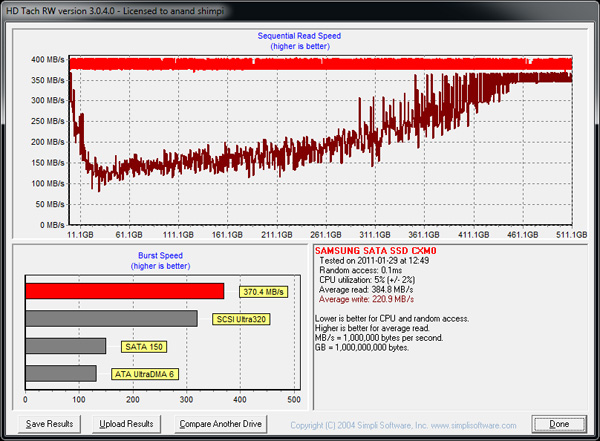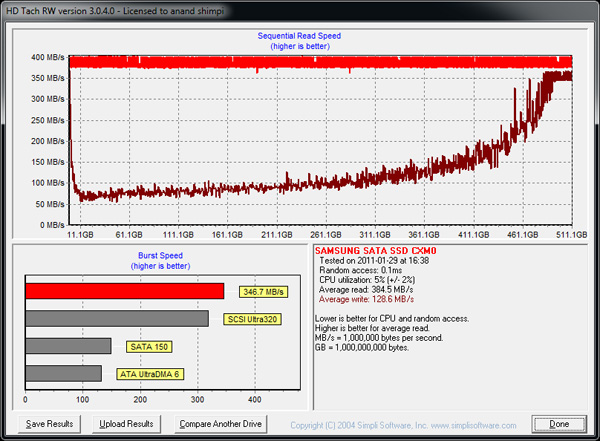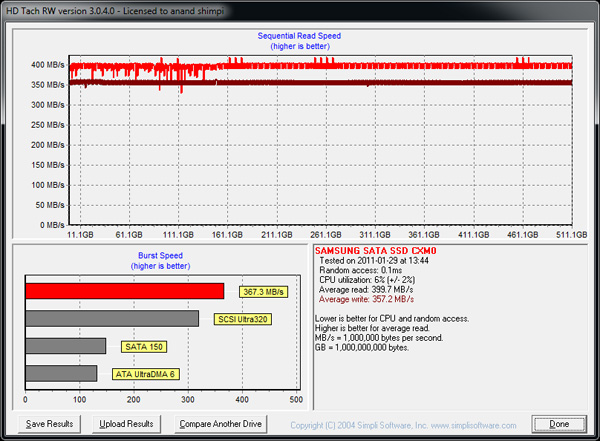The Samsung SSD 830 Review
by Anand Lal Shimpi on September 24, 2011 1:02 AM EST- Posted in
- SSDs
- Storage
- Samsung
- pm830
- Samsung SSD 830
Performance Over Time & TRIM
My biggest issue with Samsung SSDs in the past has been their extremely poor performance over time. Samsung doesn't do a lot of active garbage collection while writing in order to maintain ultra high write speeds, instead it prefers to clean up the drive during periods of little to no IO activity. Unfortunately this approach can result in pretty poor performance over time. In the old days the Samsung controllers would hit single digit write speeds, often slowing down to sub-HDD speeds. These days things are a lot better but it's still a concern. To quantify the behavior I filled all user addressible LBAs on the SSD 830, then proceeded to run our random write torture test on the now-dirty drive. After 20 minutes of torture I ran a single sequential read/write pass to measure how much of a hit the drive took.
Sequential read/write performance should be around 400/330 according to Iometer. Here's what the drive looks like after our torture test:
There's a significant drop in performance but the drive is still able to deliver ~100MB/s speeds. This graph is a bit deceptive however. After 20 minutes of 4KB random writes the SSD 830 will only write at a rate of around 20MB/s. By not doing much realtime garbage collection the random write speed can drop significantly over time, but at a lower write speed the 830 isn't penalized as much as other drives. To help deal with this issue I extended the length of our torture test to 60 minutes and re-ran:
Ah that's a lot more like it. Performance drops significantly, down to as low as 50MB/s for the earliest LBAs. Given enough idle time the 830 should correct much of this and obviously TRIMing those LBAs will restore full performance (as you'll see below) but the point is that by delaying the bulk of garbage collection the Samsung SSD 830 is able to drop in performance by a degree that I'm not super comfortable with. This phenomenon isn't exclusive to Samsung, you'll remember that we've complained about it with Crucial drives as well. Other than SandForce and Intel most controller manufacturers tend to follow a similar clean up the mess later approach to firmware design. In my opinion I'd much rather see lower peak performance and get higher worst case scenario performance as it tends to impact the user experience less.
If you are running under a TRIM enabled OS performance does restore to peak quite nicely after a TRIM pass:













99 Comments
View All Comments
iq100 - Sunday, September 25, 2011 - link
Great review, great quality video and sound, BUT please try and speak much slower.If one knows the material ahead of time, your pace is fine, BUT please remember that your audience is supposed to be those who do NOT know the material. 'Pause' is a sound! Practice making a 'pause' sound between syllables. Your articulation is good, but you leave out the intra syllable pause sound!
Ramon Zarat - Sunday, September 25, 2011 - link
Nice article, but It would be **very** useful to state firmware version of each SSD tested.For instance, the latest 0009 firmware for the M4 series provide an astonishing speed boost of around 20% depending on the condition. It's been available since Agust 25, so I assume the current test was done with M4 firmware version 0009, right?
Information of that significance, we absolutely need to know before drawing any conclusions.
Fun Guy - Monday, September 26, 2011 - link
Agreed, that is a HUGE oversight, lending the credibility of the reviews as suspect. If they can't even collect firmware information, what else are they missing? I've read at least two mistakes made and corrected already in this review, with no mention of the updates in the beginning of the thread. Very sloppy.anandtech pirate - Monday, September 26, 2011 - link
hey, why doesn't my login & password work in the forums? & when i go to create another account with my username, anandtechpirate, it says its already taken.tommythorn - Monday, September 26, 2011 - link
While I generally find Anandtech's SSD reviews to be amongst the best out there, Iwish you would give less value to compression/dedup as any who uses drive encryption
(transparently available on Mac OS X Lion for example) will not benefit at all. Notably,
this _also_ applies to 4 KB random reads/writes, not just streaming workloads.
thornburg - Monday, September 26, 2011 - link
Thanks for the review, Anand.Can you tell us whether this drive supports TRIM in OS X?
I've heard that the Apple-supplied SSDs finally do support TRIM in the newer versions of the OS. I wondered if maybe this drive (and/or the 470) are supported, since Apple sometimes uses Samsung SSDs.
Thanks.
NCM - Monday, September 26, 2011 - link
You can enable TRIM for non-Apple supplied SSDs in Mac OS X using the free TRIM Enabler, see <http://www.groths.org/?page_id=322>.Loremonger - Monday, September 26, 2011 - link
I like the video review and "putting a face" on the article. It would be nice in the future to show hands-on footage of the item being reviewed, as well as benchmarking setups and results. I think it would be quite interesting for your readers to see the testing process (heavily edited, of course; I know this stuff takes a long time).As usual, thank you for a thorough and insightful review.
mino - Monday, September 26, 2011 - link
476GiB * 1.0737 (GiB->GB) == 512.0 GBThe published TABLE thus DECLARES NO SPARE SPACE present !
I am sure that is not the case, so the table obviously needs fixing ...
Shazbud - Tuesday, September 27, 2011 - link
I am seeing what appears to be a serious inconsistency in the article:The article states (early on): "Samsung SSDs were among the first I reviewed and while they weren't anywhere near the fastest back then, every last one of those drives is still working without issue in my lab today."
In closing the comment "From a drive that I simply wouldn't recommend...." then really confuses me - why would you not recommend this drive? Speed seems to have been the only downside, but that appears to have been traded off for reliability.